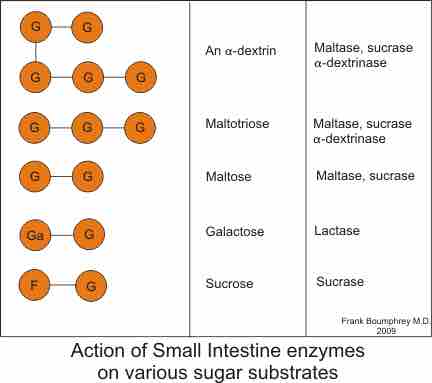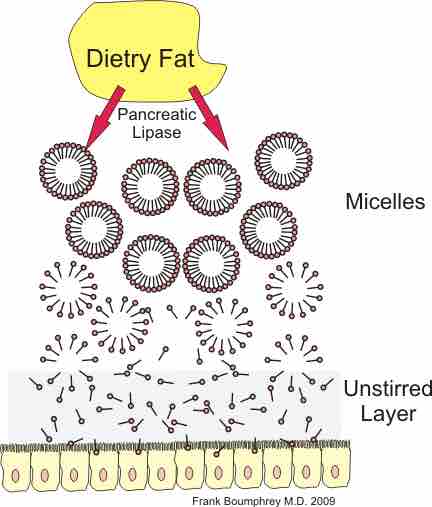Protein digestion occurs in the stomach and the duodenum through the action of three primary enzymes: pepsin, secreted by the stomach, and trypsin and chymotrypsin, secreted by the pancreas. These enzymes break down food proteins into polypeptides, which are then broken down by various exopeptidases and dipeptidases into amino acids. The digestive enzymes, however, are secreted mainly as their inactive precursors, the zymogens. Thus, trypsin is secreted by the pancreas in the form of trypsinogen, which is activated in the duodenum by enterokinase to form trypsin. Trypsin then cleaves proteins to smaller polypeptides.
In humans, dietary starches are composed of glucose units arranged in long chains of polysaccharide called amylose. During digestion, bonds between glucose molecules are broken by salivary and pancreatic amylase, resulting in progressively smaller chains of glucose. This process produces the simple sugars glucose and maltose (two glucose molecules), which can be absorbed by the small intestine. Sucrase is an enzyme that breaks down disaccharide sucrose, commonly known as table sugar, cane sugar, or beet sugar. Sucrose digestion yields the sugars fructose and glucose, which are readily absorbed by the small intestine. Lactase is an enzyme that breaks down the disaccharide lactose into its component parts, glucose and galactose, which can also be absorbed by the small intestine. Approximately half the adult population produces only small amounts of lactase and are therefore unable to eat milk-based foods. This condition is commonly known as lactose intolerance.
Digestion of certain fats begins in the mouth, where lingual lipase breaks down short chain lipids into diglycerides. The presence of fat in the small intestine produces hormones that stimulate the release of pancreatic lipase from the pancreas, and bile from the liver, enabling the breakdown of fats into fatty acids. Complete digestion of one molecule of fat (a triglyceride) results in three fatty acid molecules and one glycerol molecule.
DNA and RNA are broken down into mononucleotides by the nucleases deoxyribonuclease and ribonuclease (DNase and RNase), which are released by the pancreas.

Carbohydrate Digestion
The action of small intestine oligosaccharide-cleaving enzymes

Lipid Digestion
Lipid digestion involves the formation of micelles in the presence of bile salts, and the passage of micelles and fatty acids through the unstirred layer.